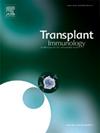Pre-transplant and transplant parameters predict long-term survival after hematopoietic cell transplantation using machine learning
IF 1.4
4区 医学
Q4 IMMUNOLOGY
引用次数: 0
Abstract
Background
Allogeneic hematopoietic stem transplantation (allo-HSCT) constitutes a curative treatment for various hematological malignancies. However, various complications limit the therapeutic efficacy of this approach, increasing the morbidity and decreasing the overall survival of allo-HSCT recipients. In everyday clinical practice, various laboratory and clinical biomarkers and scorning systems have been developed and implemented focusing on the recognition of high-risk patients for organ dysfunction-related complications and those who might experience low overall survival. However, the predictive accuracy of developed scores has been reported deficient in some studies. The aim of the current retrospective study is to develop a machine learning (ML) model to predict the long-term survivorship of patients who receive allo-HSCT based on clinical pre- and post-allo-HSCT variables, and on transplantation-related characteristics.
Methods
For this purpose, a database of 564 allo-HSCT recipients incorporating 16 clinical and laboratory variables and the survivorship status of the patients during follow-up (Alive, Dead, Alive but follow-up less than 24 months) was used. An ML model was developed and tested, based on the previously published Data Ensemble Refinement Greedy Algorithm (DEGRA) algorithm.
Results
A predictive ML model was built with 92.02 % accuracy. The eight parameters included in the algorithm were the following: CD34+ cells infused, patients' age and gender, conditioning regimen toxicity, disease risk index (DRI), graft source, and platelet and neutrophil engraftment.
Conclusion
To our knowledge, this is the first AI model incorporating post-HSCT variables for the prediction of mortality in adult HSCT recipients. In the era of precision medicine, the recognition of patients who undergo allo-HSCT and face a great risk for mortality and morbidity, with high-accuracy algorithms is crucial.

利用机器学习预测造血细胞移植后长期存活率的移植前和移植参数
背景:同种异体造血干细胞移植(allogene hematopoietic stem transplantation, alloo - hsct)是治疗多种恶性血液病的有效方法。然而,各种并发症限制了这种方法的治疗效果,增加了发病率并降低了同种异体造血干细胞移植接受者的总生存期。在日常临床实践中,各种实验室和临床生物标志物和蔑视系统已经开发和实施,重点是识别器官功能障碍相关并发症的高危患者和那些可能经历低总生存率的患者。然而,据报道,在一些研究中,发达评分的预测准确性不足。当前回顾性研究的目的是开发一种机器学习(ML)模型,以预测接受同种异体造血干细胞移植的患者的长期生存,该模型基于同种异体造血干细胞移植前后的临床变量以及移植相关特征。方法:为此,使用了564例同种异体造血干细胞受体的数据库,包括16个临床和实验室变量以及随访期间患者的生存状态(存活,死亡,存活,但随访时间少于24 个月)。基于先前发布的数据集成细化贪婪算法(DEGRA)算法,开发并测试了ML模型。结果:建立了预测ML模型,准确率为92.02 %。算法中包含的8个参数包括:输注CD34+细胞、患者的年龄和性别、调节方案毒性、疾病风险指数(DRI)、移植物来源、血小板和中性粒细胞植入。结论:据我们所知,这是第一个纳入HSCT后变量预测成人HSCT受者死亡率的人工智能模型。在精准医疗时代,对接受同种异体造血干细胞移植且面临巨大死亡和发病风险的患者进行识别,采用高精度的算法至关重要。
本文章由计算机程序翻译,如有差异,请以英文原文为准。
求助全文
约1分钟内获得全文
求助全文
来源期刊

Transplant immunology
医学-免疫学
CiteScore
2.10
自引率
13.30%
发文量
198
审稿时长
48 days
期刊介绍:
Transplant Immunology will publish up-to-date information on all aspects of the broad field it encompasses. The journal will be directed at (basic) scientists, tissue typers, transplant physicians and surgeons, and research and data on all immunological aspects of organ-, tissue- and (haematopoietic) stem cell transplantation are of potential interest to the readers of Transplant Immunology. Original papers, Review articles and Hypotheses will be considered for publication and submitted manuscripts will be rapidly peer-reviewed and published. They will be judged on the basis of scientific merit, originality, timeliness and quality.
 求助内容:
求助内容: 应助结果提醒方式:
应助结果提醒方式:


